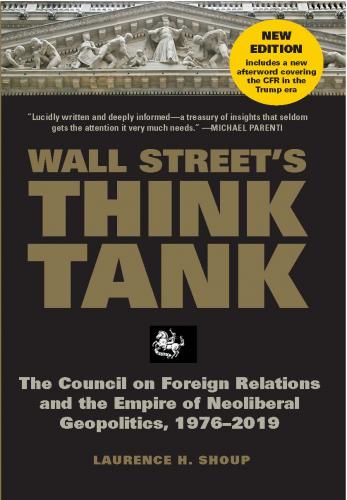Wall Street's Think Tank. Laurence H. Shoup
LAURENCE H. SHOUP received his Ph.D. in History from Northwestern University in 1974. He is the author of five books, including Imperial Brain Trust (with William Minter) and Rulers and Rebels: A People’s History of Early California, 1769-1901, as well as many articles in scholarly and popular publications. He has taught U.S. history at the University of Illinois, San Francisco State University, Sonoma State University, and has been active in anti-war and social justice movements since the 1960s.
WALL STREET’S THINK TANK
The Council on Foreign Relations and the Empire of Neoliberal Geopolitics, 1976–2014
LAURENCE H. SHOUP
MONTHLY REVIEW PRESS
New York
Copyright © 2018 by Laurence H. Shoup
All Rights Reserved
Shoup, Laurence H.
Wall Street’s think tank : the Council on Foreign Relations and the empire of neoliberal geopolitics, 1976–2014 / Laurence H. Shoup.
pages cm
Includes bibliographical references and index.
ISBN 978-1-58367-754-4 (pbk : alk. paper) 1. Council on Foreign Relations. 2. United States—Foreign relations—1977–1981. 3. United States—Foreign relations—1981–1989. 4. United States—Foreign relations—1989– 5. World politics—1989– I. Title.
JZ27.C6S56 2015
327.73—dc23
2015017149
Typeset in Arno Pro 11/14
Monthly Review Press
146 West 29th Street, Suite 6W
New York, New York 10001
5 4 3 2 1
CONTENTS
Introduction: The Early History of the CFR
Part I: Wall Street’s Think Tank, 1976–2014
1. The U.S. Capitalist Class and the Council on Foreign Relations
2. The Organizational History of the Council, 1976–2014
3. The CFR’s Domestic Network, 1976–2014
4. The International Connections of the CFR
Part II: The Empire of Neoliberal Geopolitics
5. The CFR’s Worldview, Grand Strategy, and Tactics, 1976–2014
6. Imperial Neoliberal Geopolitics in Action: The CFR and the War on Iraq, 1982–2013
7. The CFR and the Empire of Neoliberal Geopolitics: Case Studies
8. Fiddling while the Earth Slowly Burns: The Council and the Ecological Crisis, 1990–2014
Concluding Reflections: Capitalist Class Rule vs. Democracy and the Public Interest
Appendix: CFR Officers and Directors, 1921–2013
The moment we … hesitate to tell the truth that is in us, and … are silent when we should speak, the divine floods of light and life flow no longer into our souls. Every truth we see is ours to give the world, not to keep to ourselves alone.
—ELIZABETH CADY STANTON
If there is no struggle there is no progress … Power concedes nothing without a demand. It never did and it never will. Find out just what any people will quietly submit to and you have found out the exact measure of injustice and wrong which will be imposed upon them …
—FREDERICK DOUGLASS
The truth is the whole.
—HEGEL
PREFACE
We may have democracy, or we may have wealth concentrated in the hands of the few, but we cannot have both.
—SUPREME COURT JUSTICE LOUIS BRANDEIS
The think tank of monopoly-finance capital, the Council on Foreign Relations is the world’s most powerful private organization. The CFR is the ultimate networking, socializing, strategic-planning, and consensus-forming institution of the U.S. capitalist class. It is the central “high command” organization of the plutocracy that runs the country and much of the world. The Council is the most important U.S. and global center of “deep politics” and the “deep state” that rules behind the scenes, a way that the 1 percent conducts their unrelenting class war against the 99 percent. Despite pretensions to “democracy” and endless attempts at instructing the world, U.S. “democracy” is, in reality, largely a fraud, a hollowed-out shell, devoid of any substantive content. The fact is that the U.S. government—led behind the scenes by the CFR—is largely run in an anti-democratic fashion by and for the interests of a financialized capitalist class, their corporations, and the wealthy families that control and benefit from these corporations. No matter who is elected, people from the Council propose, debate, develop consensus, and implement the nation’s key strategic policies. The deep state, in the form of the CFR, operates behind the scenes, making and enforcing important decisions outside of those publicly sanctioned by law and society. A focus on the Council on Foreign Relations is a key way to understand concretely the central sector of the ensemble of power relations in the United States and its informal global empire.
The globalized system that the Council operates within and influences the development of is monopoly-finance capitalism.1 Neoliberalism is today’s enabling and legitimizing ideology of monopoly-finance capitalism, helping the system grow and spread. We say “capitalist” because this system is mainly privately controlled and has as its primary goal constantly increasing profits and the use of these for the endless accumulation of capital. The plutocracy that dominates the system is centered in the United States, but has powerful allied branches in Western Europe and Japan especially. We say “monopoly” capitalist system because
